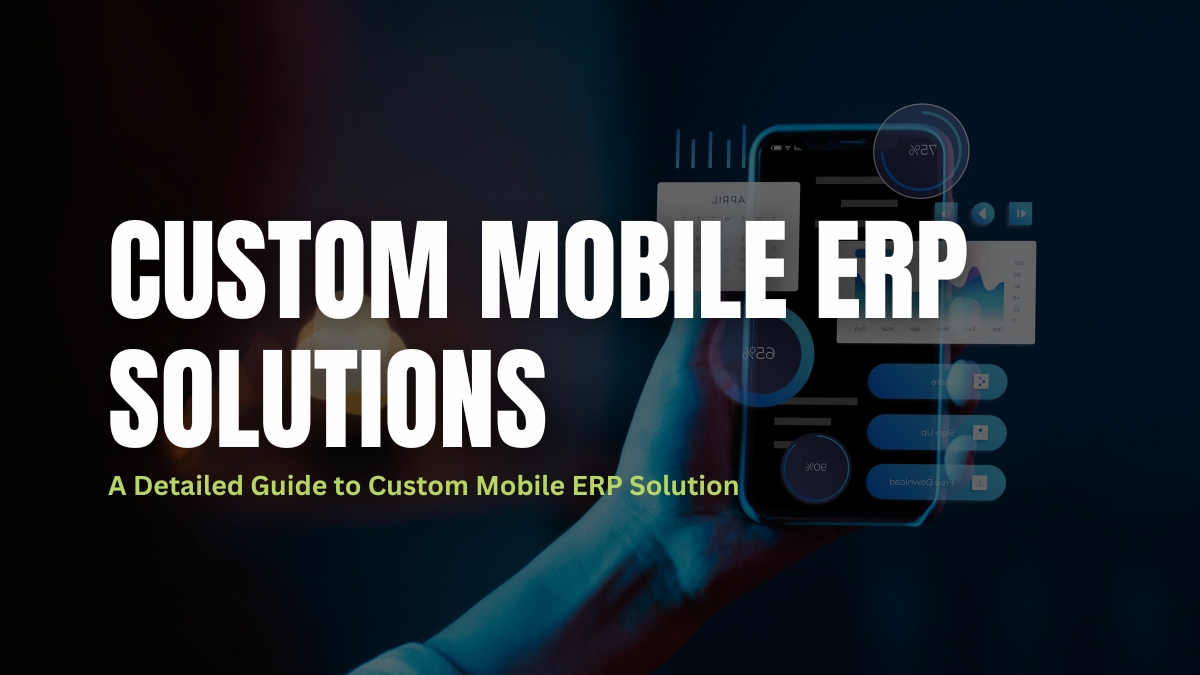In today’s fast-paced business landscape, Enterprise Resource Planning (ERP) systems play a pivotal role in streamlining operations, enhancing productivity, and ensuring data-driven decision-making. As organizations increasingly embrace mobility, the demand for Mobile ERP Solutions has surged. In this comprehensive guide, we delve into the intricacies of developing custom mobile ERP solutions, uncovering their challenges, benefits, and the development process.
1. Understanding Mobile ERP Solutions
What Are Mobile ERP Solutions?
Mobile ERP solutions extend the power of traditional ERP systems to mobile devices. They allow users to access critical business data, collaborate remotely, and perform essential tasks on the go. Whether it’s inventory management, sales tracking, or financial reporting, mobile ERP apps empower employees to stay connected and efficient.
2. Benefits of Mobile ERP Solutions
- Anytime, Anywhere Access: Mobile ERP apps break the shackles of office desks. Employees can access real-time information from their smartphones or tablets, whether they’re in the field, at a client site, or working remotely. This accessibility enhances agility and responsiveness.
- Improved Decision-Making: Timely access to data enables informed decision-making. Managers can analyze performance metrics, monitor KPIs, and respond swiftly to market changes. Whether it’s approving purchase orders or reviewing financial reports, mobile ERP solutions facilitate quick actions.
- Enhanced Productivity: Mobile ERP streamlines processes, reducing manual work. Field service technicians can update work orders, sales representatives can track leads, and warehouse staff can manage inventory—all without being tied to a desktop. This efficiency translates to higher productivity.
- Seamless Collaboration: Collaboration across departments becomes seamless with mobile ERP. Sales teams can sync customer data, supply chain managers can coordinate shipments, and HR professionals can manage employee records—all within a unified platform.
- Competitive Edge: Organizations that embrace mobile ERP gain a competitive edge. They respond faster to customer inquiries, adapt swiftly to market shifts, and optimize resource allocation. In a digital era, staying ahead requires mobility.
3. Challenges in Mobile ERP Development
- User Experience (UX) Design: Creating an intuitive and user-friendly interface for mobile ERP apps is crucial. Balancing functionality with simplicity ensures adoption and minimizes training overhead.
- Security and Compliance: Mobile ERP solutions handle sensitive business data. Robust security measures encryption, authentication, and secure APIs are essential. Compliance with industry regulations adds complexity.
- Integration with Existing Systems: Seamless integration with existing ERP systems (on-premises or cloud-based) is a challenge. Data synchronization, API compatibility, and maintaining data consistency are critical.
- Platform Diversity: Developing for iOS, Android, and potentially other platforms requires careful planning. Cross-platform development tools or native development—each has its trade-offs.
4. The ERP Mobile Application Development Process
- Requirements Gathering: Understand business needs, user expectations, and functional requirements. Involve stakeholders from different departments.
- Design and Prototyping: Create wire-frames, mock-ups, and prototypes. Iterate based on feedback to ensure an optimal UX.
- Development: Choose the development approach (native, hybrid, or cross-platform). Develop core features, integrate APIs, and focus on performance.
- Testing and Quality Assurance: Thoroughly test the app—functional, usability, security, and performance testing. Address any issues promptly.
- Deployment and Maintenance: Deploy the app to app stores or enterprise distribution channels. Regular updates, bug fixes, and enhancements are part of ongoing maintenance.
Conclusion
Custom mobile ERP solutions bridge the gap between traditional ERP systems and modern workforce dynamics. By embracing mobility, businesses unlock efficiency, agility, and competitive advantage. As you embark on your mobile ERP journey, remember that thoughtful planning, robust development, and continuous improvement are the keys to success.
Remember: The future of ERP is in your pocket.





